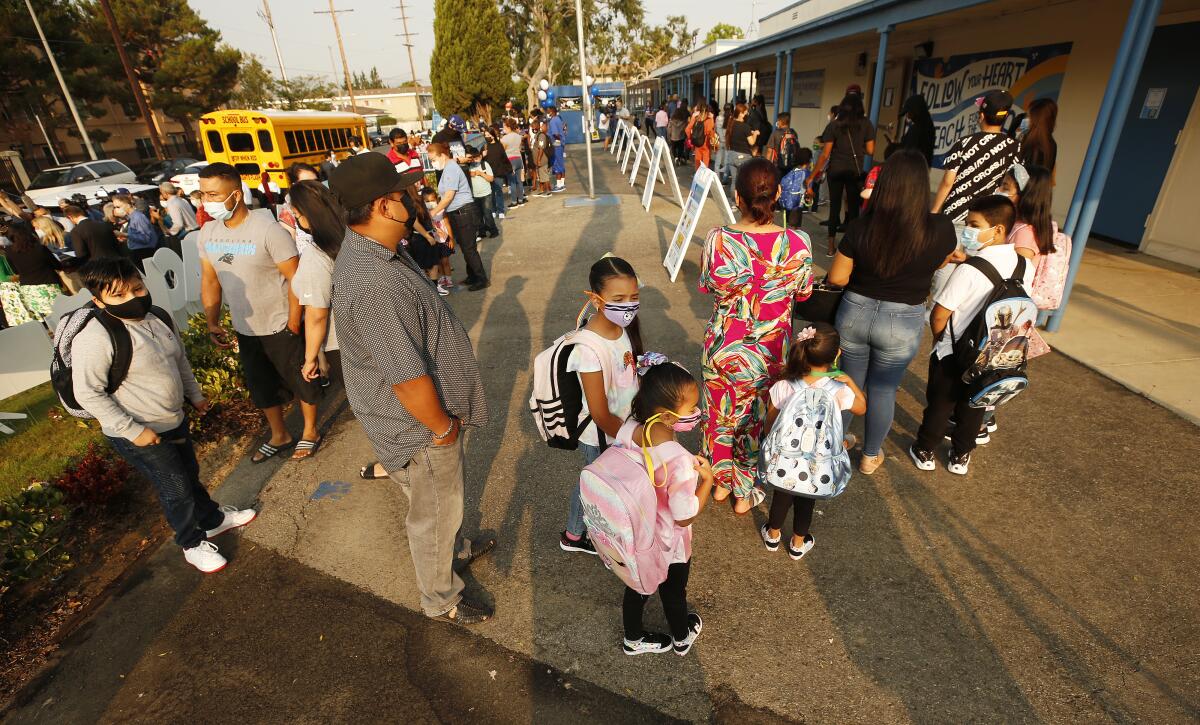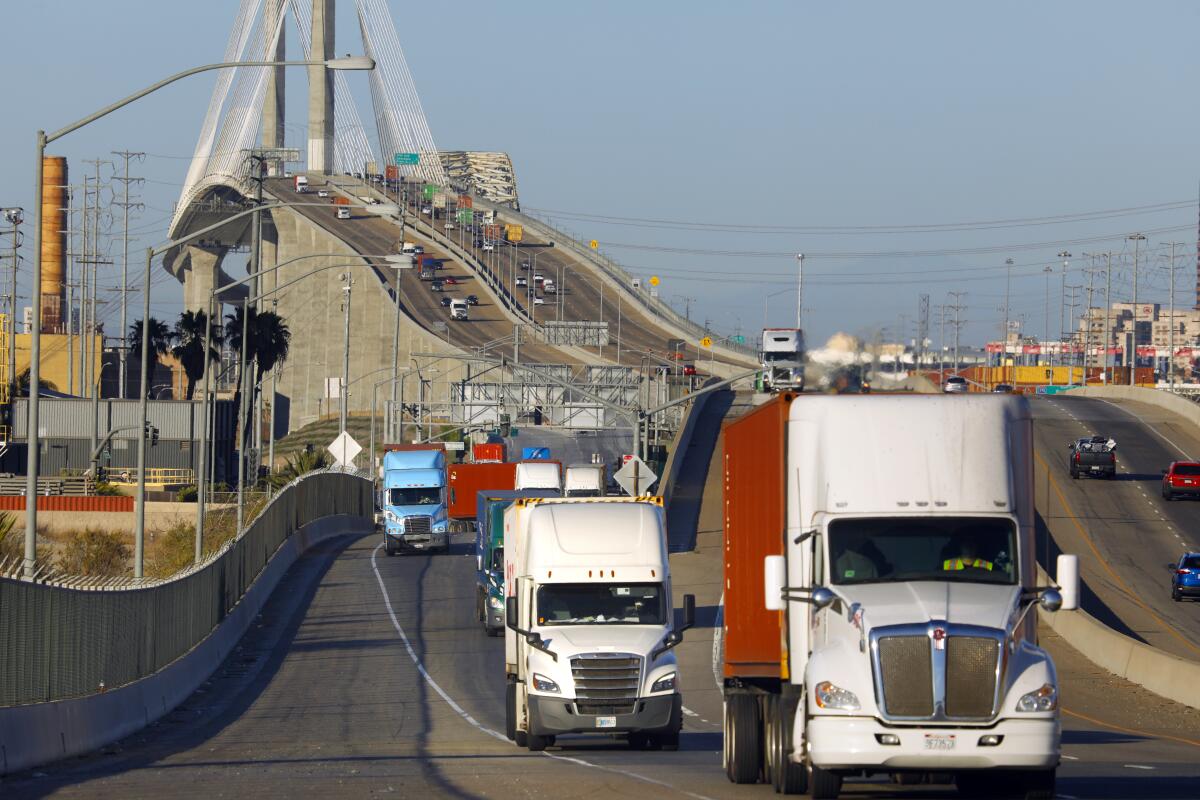Here’s what happened when Los Angeles Unified School District students returned to campuses

- Share via
Good morning, and welcome to the Essential California newsletter. It’s Tuesday, Aug. 17. I’m Justin Ray.
This year’s return to school marks the third academic year the education of California’s 6 million kids has been affected by the COVID-19 pandemic. The opening of schools this month — including the Los Angeles Unified School District on Monday — unfolds as the Delta variant continues to spread in the United States.
Excitement and anxiety filled the air as children once again flocked to campuses. But some large institutions experienced long lines as daily health checks slowed down the process. Many students ended up missing their first period classes.
Matthew, 17, a student at John Marshall High School in Los Feliz, was excited for the first day of school. But he said the wait in line slowly “killed my mood.”
There were also some issues with the district’s health check app, Daily Pass. Parents are meant to use it to attest that their children are healthy. Through the Daily Pass system, students receive a scannable code to enter school. They can also answer questions about their health from a screener at the entrance to campus, an alternative that also caused delays.
When asked whether long lines to enter campus would be the new norm, Acting L.A. Unified Supt. Megan Reilly said: “Today is the first day of school. I think we’ll get better and better as each day goes by.”
The safety protocols at the district’s schools are being touted as among the strictest in the nation, relying on layers of measures — such as masking, improved ventilation and increased hand-washing. District officials are determined to carry out a colossal effort: screening every single student, teacher and staff member — more than half a million people — once a week for the foreseeable future.
But some have opted not to go through the process at all. The parents of about 3% of students have indicated they will instead opt for an online education option through an independent study program. Making that choice required filling out lengthy forms and leaving behind familiar classmates and teachers — at least for the time being.
Here are three things to know about the return to schools in California:
What precautions are being recommended?
On July 19, the Centers for Disease Control and Prevention published its updated recommendations for K-12 schools. It suggests universal masking in schools, targeted quarantine practices and access to a robust coronavirus testing program. But above all else, the state of California and the Los Angeles County Department of Public Health stress vaccination for all eligible individuals and masking in classrooms and school buildings.
What is the current state of COVID among children?
The state is seeing about 18 new COVID-19 hospitalizations a day for children up to age 17 over a recent seven-day period. The latest hospitalization numbers are still below the peak of about 29 new COVID-19 hospitalizations a day recorded in January, according to the CDC. COVID-19 deaths among children remain relatively low. Of a cumulative COVID-19 death toll of more than 64,000 Californians, 30 fatalities statewide have been among children. Rates of new hospitalizations among kids and teens here have not reached the heights as seen in the hardest-hit parts of the country. Public health officials have said that California has taken steps to ensure children can go back to school safely. They also believe higher-than-average levels of vaccination in the state will help protect children.
“Parents should feel reassured that case rates are still very low amongst children; serious illnesses still remains relatively rare,” said L.A. County Public Health Director Barbara Ferrer. “And if we all are doing our part, we’re hopeful that schools are going to open with a lot of safety and without a lot of increased risk.”
Who is making the rules?
School districts around the state have the authority to create their own policies. The only condition is that state and local health department requirements have to be met. This means your school district could have rules that are stricter than the state’s. All school districts are required by the state to post detailed safety plans on their websites, which is where you can find information specific to your school district and campus. Every school district in California was required to submit its plan to the state.
We have a lot more information in our FAQ about the return to schools (I highly recommend this story; it answers many, many questions). We published an exhaustive look at the LAUSD’s $350 million effort to ensure a safe return to campus. We also have a reopening tracker.
Before I begin with my links, a note: The Los Angeles Times is following the events in Afghanistan. As you all know, this newsletter covers California-specific events and while the rapid collapse of the country’s government is immensely important, it lays outside my purview. But I did want to mention that we have covered topics such as what lays ahead, the fear of terrorism in the U.S. and the confusion, disappointment and anger for veterans.
And now, here’s what’s happening across California.
Note: Some of the sites we link to may limit the number of stories you can access without subscribing.
L.A. STORIES
A man and a woman were decapitated in a car wreck on the 5 Freeway, officials with the California Highway Patrol said. Authorities said alcohol and excessive speed may have been factors in the Sunday crash, which occurred just before 1 a.m. in the southbound lanes near the 405 Freeway exchange in Sylmar. The car “failed to maintain the curve in the roadway before traveling out of control” and crashing into a big rig. Los Angeles Times
Our daily news podcast
If you’re a fan of this newsletter, you’ll probably love our new daily podcast, “The Times,” hosted by columnist Gustavo Arellano, along with reporters from across our newsroom. Every weekday, it takes you beyond the headlines. Subscribe on Apple Podcasts and follow on Spotify.
POLITICS AND GOVERNMENT
They fought for clean air. They didn’t know they were part of a gas industry campaign. Diesel truck pollution from the busiest port complex in the United States has fouled the air in nearby neighborhoods in Southern California for decades. So when port officials asked for feedback on cleaning up that pollution, hundreds of people weighed in. But officials didn’t know that some of the locals who urged support for natural gas trucks were being paid by a firm hired by the natural gas industry. It’s not the first time companies have attempted to control the message around energy. Los Angeles Times

CRIME AND COURTS
After years spent denying it, Robert Durst admitted in court Monday that he wrote a critical piece of evidence in his Los Angeles trial. Durst, 78, testified that he and Susan Berman had planned a Christmas “staycation” in Los Angeles and that he was traveling to see her the week she was killed. When he arrived at her house in December 2000, he found her bleeding on the floor. He called 911 and when the operator answered, he didn’t want to give his name. Durst said he instead opted to write what has come to be known as the “cadaver note” — a scrap of paper containing only Berman’s address on Benedict Canyon Drive and the word “cadaver” — and mailed it to the Beverly Hills Police Department. Los Angeles Times
Animal-loving Turlock teen dies from injuries suffered when a truck hit her and her horse. Summer Vigil-Gardner, 19, was riding the horse named Riggs on their regular route Saturday when the driver of a Chevrolet Silverado hit them. The horse died at the scene. The teen was sent to Doctors Medical Center after suffering a severe brain injury. Following the incident, she had no brain activity and has since been taken off life support. Modesto Bee
Support our journalism
HEALTH AND THE ENVIRONMENT
PG&E plans power shutoffs as Dixie fire rages in Northern California. Pacific Gas & Electric Co. announced it could cut power for about 39,000 residents across 16 counties in Northern California on Tuesday night to reduce the risk of wildfires from energized power lines. Strong southwest winds are expected to arrive in the northern part of the state beginning late Monday, colliding with searing temperatures and parched vegetation — a conditions known to stoke extreme fire behavior. Los Angeles Times
CALIFORNIA CULTURE
Dodgers pitcher Trevor Bauer’s hearing on whether the woman who has accused him of sexual assault should be granted a restraining order for the next five years got underway Monday morning after a request by Bauer’s attorneys for a third continuance was denied by a judge. Following opening statements, the accuser was the first witness called. The San Diego resident testified that on April 18 she created an Instagram story while watching Bauer pitch and tagged his account. She didn’t expect him to respond because he has 400,000 followers. Bauer did respond, and they exchanged Instagram direct messages for three days. Los Angeles Times
A year after fire, burned Santa Cruz forests sprout with new life but growing takes time. The CZU Lightning Complex fire burned about 86,500 acres from the Santa Cruz Mountains into San Mateo County. In Fall Creek, redwoods now bear charcoal scars. But the trees still stand. “It’s very very difficult to kill a redwood tree,” said Joanne Kerbavaz, senior environmental scientist with California State Parks. But other trees aren’t as resilient to wildfire. Santa Cruz Sentinel
Free online games
Get our free daily crossword puzzle, sudoku, word search and arcade games in our new game center at latimes.com/games.
CALIFORNIA ALMANAC
Los Angeles: Go for a swim! 85. San Diego: 78. San Francisco: Days that ends in “day” are good for ice cream! 69. San Jose: 78. Fresno: 102. Sacramento: 90.
AND FINALLY
Today’s California memory is from Shane VerPlanck:
I was born in 1946, the child of an Oklahoma “cowboy” and an English War Bride. We lived in an area called Richland Farms in Compton and my father built two houses by himself. We had a wonderful neighbor named Mr. Ellerman who had actually come to Compton in a covered wagon with his tiny Scottish wife. The neighborhood hero, he’d taught us to fly kites and to walk on tin can stilts. I later learned that Mr. Ellerman left his acreage to the city of Compton to be made into a park for the children, where it remains today.
If you have a memory or story about the Golden State, share it with us. (Please keep your story to 100 words.)
Please let us know what we can do to make this newsletter more useful to you. Send comments to essentialcalifornia@latimes.com.
Sign up for Essential California
The most important California stories and recommendations in your inbox every morning.
You may occasionally receive promotional content from the Los Angeles Times.







